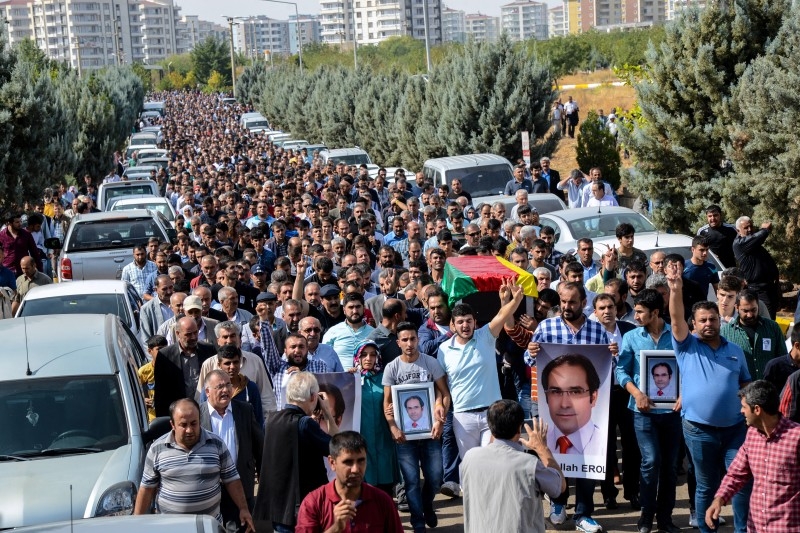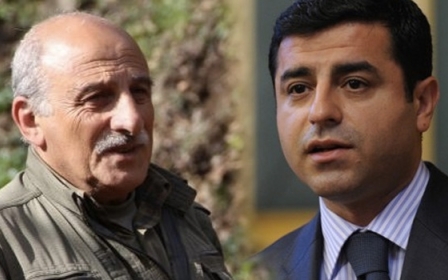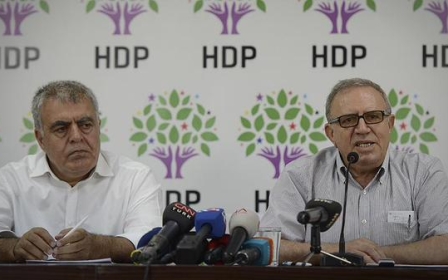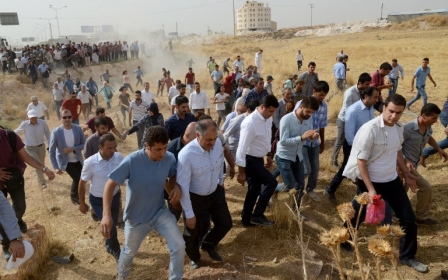Security concerns overshadow buildup to Turkish vote

Turkey is set to go to the polls on Sunday in parliamentary elections intended to break the political stalemate that followed June's indecisive vote and the subsequent collapse of coalition talks.
But conditions in the country have changed dramatically since June, with the breakdown of the ceasefire between the Kurdistan Workers Party' (PKK) and the Turkish state, coupled with a rise in attacks purportedly by the Islamic State (IS) group, making the country a dangerous environment for many activists.
The Peoples' Democratic Party (HDP), which overwhelmingly draws its support from the majority-Kurdish regions in the southeast of Turkey, has faced particular pressure.
Since the collapse of the ceasefire, the southeast of Turkey has seen major operations by Turkish security services, with scores of local HDP mayors and hundreds of activists reportedly languishing in prisons.
HDP spokespeople have claimed that over 1,400 members of the HDP and its sister Peace and Democracy Party (BDP) have been detained while 220 have been formally arrested, including co-mayors of Hakkair, Sur, Silvan and Edremit provinces.
Nazmi Gur, the HDP Vice co-Chair for Foreign Affairs, said that his party's activists felt a new atmosphere of violence surrounding their campaigning.
“After the bombing in Ankara we cancelled all our mass activities, like demonstrations, like open air meetings, rallies, because there was a continuing risk against us and a risk of assassination against our leaders,” he told Middle East Eye, adding that the leadership now had police guards.
Other HDP members have complained that there has been a lack of police protection during their demonstrations.
“How was there no police to protect us?” Yildiz Kilinc, a member of the HDP, told the Independent newspaper, referring to the Ankara bombing.
Noah Blaser, a journalist focusing on Turkey, said that such a mindset had become pervasive across Kurdish-majority regions.
"Throughout the southeast there’s a pervasive sense that if there were any attacks by IS designed to complicate the election day, the security measures would in no way prevent them from happening," he told MEE.
He pointed out that many Kurds have been suspicious of the revelations that the IS cell responsible for not only the Ankara bombing, but also bombings in Suruc, Diyarbakir, Adana and Mersin had been known to Turkish authorities and that no arrests had been made.
“There have been four attacks and these attacks stem all the way back to the election last year, so for Kurds the memories of security lapses and the risk of IS defintely overlaps with election day and there’s a sense among HDP supporters that their lives are at risk when they support their party, whether that's in a political rally or voting," he said.
"There’s definitely a pervasive sense that there’s no proper security measures.”
The root of much of the HDP’s problems stems from a common perception that they represent a legal parliamentary outgrowth of the PKK - described by Turkish President Recep Tayyip Erdogan as an “inorganic” link - due to their support of Kurdish national aspirations and their alleged veneration of PKK founder Abdullah Ocalan.
As a result, among the public and the security services, acts of violence by the PKK have been collectively blamed on the HDP, despite calls by the latter for the restoration of the ceasefire and a cessation of hostilities on both sides.
Both prior to the election and after the collapse of the ceasefire, HDP offices were subjected to ransacking by far-right street gangs.
Members of the ultra-nationalist Grey Wolves - a paramilitary movement linked to the Nationalist Movement Party (MHP) - and the Ottoman Hearths, an AKP-linked street movement, are thought to have been among the main instigators of the attacks.
Over the space of five days in early September - following the deaths of 14 police officers in a Kurdish militant attack - over 130 HDP buildings were attacked, with many burnt out and Turkish flags hung from the windows. In other areas, Kurds and Kurdish businesses were assaulted, with one man reported to have been forced to kiss a bust of Turkey’s founder Mustafa Kemal Ataturk on camera.
On October 23, the HDP claimed that a local court in Agri province had banned the HDP's election manifesto due to its references to "administrative self-rule".
The mounting threat of violence and reported lack of security has left many wary of what the weekend could bring.
“The most important violation against the HDP is created by the AKP, President Erdogan and the mass media that they control - with hate language, everyday they insult us,” said Gur.
“We have a fear on November 1 for the real security of the polling stations.”
Special security zones
A report released by the Organisation for Security and Cooperation in Europe (OSCE) last week raised concerns about attempts by the Turkish government to manipulate the outcome of the vote in Kurdish-majority areas.
According to the report, OSCE interlocutors had “alleged political motivation on the part of the AKP to limit the number of votes for the HDP in these provinces” following the imposition of Special Security Zones (SSZs), ostensibly in place due to the rise of militant activity.
“In some provinces of the east and the southeast, the ability to campaign freely is considerably restricted by the deteriorating security situation where Special Security Zones (SSZs) have been declared and/or curfews imposed,” said the report.
“These measures are criticised by some OSCE/ODIHR LEOM (Office for Democratic Institutions and Human Rights Limited Election Observation Mission) interlocutors as politically motivated and beyond the legal framework.”
The main motive given by the government for the establishment of SSZs has been the rise in Kurdish militancy in the southeast, a region known to Kurdish nationalists as North Kurdistan or Bakur.
The Patriotic Revolutionary Youth Movement (YDG-H) - frequently referred to as the PKK's youth wing - have been primarily responsible for the scores of police and military personnel killed in the southeast. In a number of districts they declared autonomous self-management, blockading roads against entry by security forces - with transgressions met by AK-47 fire.
"For the first time after June 7, the PKK is seizing civilian areas," AKP parliamentary candidate Galip Ensaroglu said, speaking to the Zaman newspaper. "It has become an everyday problem for people in those areas."
He added that the PKK was "making civil life unbearable".
But local activists, journalists and human rights observers have claimed that the imposition of curfews and SSZs has been provocative and reminiscent of the techniques used by the Turkish army at the height of its conflict with the PKK in the 1990s.
"If you do not leave the zones, you are liable for prosecution; there is no security of life there," Emma Sinclair-Webb, Human Rights Watch's senior Turkey researcher, told the Hurriyet newspaper.
"The press cannot be there; you cannot have freedom of expression in those areas; you cannot have freedom of movement and there is a big risk of the arbitrary use of power in those areas against citizens and that could be very abusive."
Turkish interior minister Selami Altinok has stated that hundreds of thousands of security officials will be deployed to monitor the election, citing clashes with Kurdish militants.
“We are taking measures regarding election security with our 385,000 security forces. Around 255,000 of them are police forces and 130,000 are gendarmerie forces reinforced by the Land Forces personnel,” Altınok told Anadolu Agency.
He added that there were 231 residential areas in 22 provinces that had been declared either as SSZs or as “military forbidden zones".
'Post-election problem'
Regardless of the outcome of Sunday's elections, when the dust falls there will still be swathes of the southeast where a majority of residents remain implacably hostile to the Turkish state and unlikely to want to see a return to the status quo.
"I think the high militarised presence of those groups inside of city centres in the southeast is really a post-election problem. These people have refused to back down and they have refused to allow police back into their community and they won't accept a regular police presence again," said Blaser.
"So, in the absence of a significant advance in peace talks that seems highly unlikely at this moment, it seems highly unlikely that that situation will be resolved, regardless of the outcome of the election."
"The worry for the HDP right now is the security situation in the southeast. It's already gone beyond their control and their calls for the PKK to stop fighting haven't really had an effect. That situation could continue to worsen, and I think that's the biggest concern of the HDP."
Middle East Eye propose une couverture et une analyse indépendantes et incomparables du Moyen-Orient, de l’Afrique du Nord et d’autres régions du monde. Pour en savoir plus sur la reprise de ce contenu et les frais qui s’appliquent, veuillez remplir ce formulaire [en anglais]. Pour en savoir plus sur MEE, cliquez ici [en anglais].




